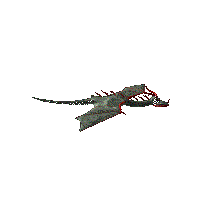 |
 ummary: ummary:
|
|
 |
 eowulf Attacks the Dragon. eowulf Attacks the Dragon.
 eowulf makes his final boast. He says that, even
though he is old, he shall “still seek battle, perform a deed of fame” by
killing the dragon. (Norton59) eowulf makes his final boast. He says that, even
though he is old, he shall “still seek battle, perform a deed of fame” by
killing the dragon. (Norton59)
|
|
 |
|
|
 e doesn't know how to grapple with the dragon,
like he did with Grendel, so he will use a sword and shield. He tells his men that the
outcome will be “with us at the wall as fate allots, the
ruler of every man.” (59) e doesn't know how to grapple with the dragon,
like he did with Grendel, so he will use a sword and shield. He tells his men that the
outcome will be “with us at the wall as fate allots, the
ruler of every man.” (59) |
 e tells them to let him fight the monster
alone, “By my courage I will get gold, or war will take your king, dire life-evil.” (60) e tells them to let him fight the monster
alone, “By my courage I will get gold, or war will take your king, dire life-evil.” (60) |
|
|

* hese three quotations indicate pagan elements of glory, not Christian.* hese three quotations indicate pagan elements of glory, not Christian.* |
 eowulf approaches the barrow. From the stone arch, he feels the dragon’s fire
emanating from within. He shouts at the dragon. The dragon knows he is there and breathes
fire. Beowulf hits the dragon with his shield and draws his sword, “the old heirloom.” (60) eowulf approaches the barrow. From the stone arch, he feels the dragon’s fire
emanating from within. He shouts at the dragon. The dragon knows he is there and breathes
fire. Beowulf hits the dragon with his shield and draws his sword, “the old heirloom.” (60) |
|
|
 he dragon comes forward, “hastening to
his fate,” (60) and breathes fire, but Beowulf is protected by his iron shield. But,
“for the first time, the first day in his life, he might not prevail, since fate did
not assign him such glory in battle.” (60) he dragon comes forward, “hastening to
his fate,” (60) and breathes fire, but Beowulf is protected by his iron shield. But,
“for the first time, the first day in his life, he might not prevail, since fate did
not assign him such glory in battle.” (60) |
 eowulf strikes the dragon so hard with his
sword, that the “edge failed.” (60) The “war blade had failed, naked at
need, as it ought not to have done, iron good from old times.” (60) eowulf strikes the dragon so hard with his
sword, that the “edge failed.” (60) The “war blade had failed, naked at
need, as it ought not to have done, iron good from old times.” (60) |
|
|
* he sword is given
living qualities* he sword is given
living qualities* |
 he poet reminds the reader that “every
man must give up the days that are lent him” (60), an elegaic theme that runs throughout the poem. Beowulf and the
dragon come together again. The dragon breathes fire again and, for the first time in the
poem, “he who before had ruled a folk felt harsh pain.” (60) he poet reminds the reader that “every
man must give up the days that are lent him” (60), an elegaic theme that runs throughout the poem. Beowulf and the
dragon come together again. The dragon breathes fire again and, for the first time in the
poem, “he who before had ruled a folk felt harsh pain.” (60) |
|
|
 eanwhile his men flee to the woods, except for
one. Wiglaf, son of Weohstan, a Scylfing, is “mindful of
the honors he had given him before, the rich dwelling-place
of the Waegmundings, every folk-right such as his father
possessed.” (60-61) eanwhile his men flee to the woods, except for
one. Wiglaf, son of Weohstan, a Scylfing, is “mindful of
the honors he had given him before, the rich dwelling-place
of the Waegmundings, every folk-right such as his father
possessed.” (60-61) |
 iglaf, although never proven in battle, grabs
his wooden shield and his sword, which was an heirloom of Eanmund.
Wiglaf’s “heart’s courage did not slacken, nor
did the heirloom of his kinsman fail him.” (61) iglaf, although never proven in battle, grabs
his wooden shield and his sword, which was an heirloom of Eanmund.
Wiglaf’s “heart’s courage did not slacken, nor
did the heirloom of his kinsman fail him.” (61) |
|
|
 iglaf gives a speech reminding his companions
about their duty which includes the only Christian reference in the passage. He says,
“God knows of me that I should rather that the flame enfold my body with my gold-giver. It does not seem right to me for us to bear our
shields home again unless we can first fell the foe, defend the life of the prince of the
Weather-Geats.” (61) iglaf gives a speech reminding his companions
about their duty which includes the only Christian reference in the passage. He says,
“God knows of me that I should rather that the flame enfold my body with my gold-giver. It does not seem right to me for us to bear our
shields home again unless we can first fell the foe, defend the life of the prince of the
Weather-Geats.” (61) |
* nother curious mixture of pagan and Christian
ideas* nother curious mixture of pagan and Christian
ideas* |
|
|
 he passage ends with Wiglaf wading through the
smoke to join Beowulf, who is encircled in the dragon's flames. he passage ends with Wiglaf wading through the
smoke to join Beowulf, who is encircled in the dragon's flames. |
